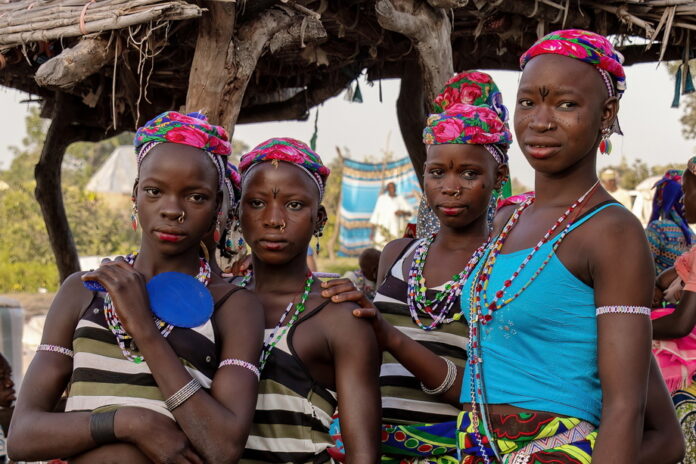The agrarian spirit and vibrant cultural identity of the Kambari people
The Kambari are a people whose traditions are firmly rooted in the land that nourishes them and whose stories whisper the echoes of a proud past. Though small in number, they boast a vibrant cultural identity often overlooked in Nigeria’s larger tapestry.
Kambari History
The Kambari, also known as Kamberi or Ashingin, are primarily located in Niger and Kebbi States, with smaller presences in Kwara, Sokoto, Nasarawa, and Zamfara. Their communities are mostly rural and dispersed.

Linguistically, the Kambari languages belong to the Kainji branch of the larger Benue–Congo family, and are grouped into at least three dialect clusters; Tsishingini, Tsikimba, and Cishingini, with variations that are not always mutually intelligible. Their origins remain partly vague, though some narratives suggest a connection to migrations from Bornu over a century ago.
READ ALSO: The Jukun Tribe: Into the enduring traditions of the mighty Kwararafa Kingdom (Pictures)
Traditions and Ceremonies
Kambari cultural life is rich in ritual and expression. For instance, traditional marriage ceremonies are communal, marked by the slaughter of goats or cows and the symbolic act of the groom eating food prepared by the bride’s family, at which point the matrimonial tie is considered knotted.

Intriguingly, the Kambari men do not claim attraction based on nudity, in a society historically noted for earlier practices of near-nudity, but rather on the artistry of women’s braided hair, tattoos, good manners, and overall presentation.
READ ALSO: Guardians of Heritage: Glance at Bolawa tribe of Fika (Video)
Dance
Dances are also a core part of their cultural fabric. The “Igbe” dance honours hunters and their catches; “Ikuru” celebrates naming and marriages; while the “Virgin Dance” features young women dancing in a bridal rite context, symbolically inviting suitors.
Another annual cultural anchor is the Molongom Festival, a people-powered celebration that reinforces identity, unites generations, and spares no homage to deities or spirits, focusing instead on communal remembrance through costume, drumming, and dance.
READ ALSO: The Kilba/Hoba People of Adamawa: Custodians of remarkable culture, history (pictures)
Food and Economy
Agriculture is the epitome of the Kambari. They are passionate farmers of millet, guinea-corn, groundnuts, yams, rice, sorghum, beans, and corn; ingredients that feed their communities and beyond. Many keep chickens and goats, while wealthier families maintain cattle herds.

Despite this productivity, the Kambari remain marginalised. The terrain is often remote and underdeveloped, with poor roads and minimal healthcare. Their semi-nomadic tendencies, use of donkeys for transport, and reliance on subsistence agriculture further underline the challenges of modernisation and the persistence of a way of life deeply tied to ancestral rhythms.
READ ALSO: Marked By Culture, Judged By Society: Nigerians with tribal marks speak out on stigma, pride, pain
Spiritual Beliefs
Spiritual life among the Kambari is rooted in traditional animist systems. Many worship a deity named Magiro, and once revered Azangunu as well, though both deities have faded from active worship, their legacy survives in rituals and dances that affirm communal bonds.
Beliefs in spirits, ancestors, witchcraft, ghosts, magic, and the power of medicines and oaths remain deeply embedded. Ghosts, for instance, are said to appear at night with fiery auras and can be dangerous, reflecting a perspective that is rich in supernatural interpretation. Animism is central, and various inanimate objects may be worshipped or sacrificed to for protection and guidance.

The Kambari songs, ceremonies, and harvests narrate a story of belonging, one that refuses to die. Through their traditions and beliefs, the Kambari remind us that true identity thrives not just in uniformity, but in the vibrant reality of rooted and relished histories.
Follow the Neptune Prime channel on WhatsApp:
Do you have breaking news, interview request, opinion, suggestion, or want your event covered? Email us at neptuneprime2233@gmail.com





